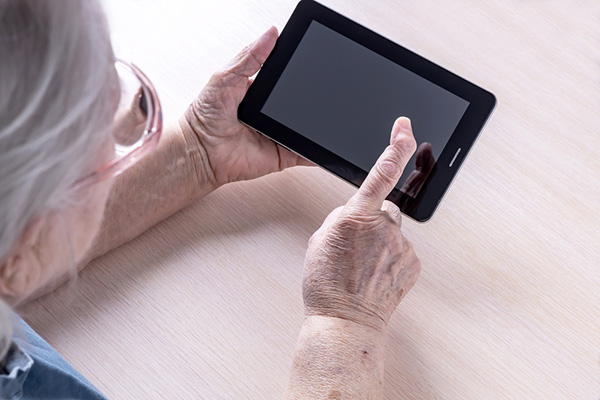Jonathan Hunt, director of client services, Charis
In our digitally driven society, it is easy to forget that there is still a meaningful proportion of homes that are not connected to the internet or have easy access to a laptop, tablet or smartphone. A recent Ofcom report found that six per cent of households were unconnected – not a huge percentage, but one that equates to about 1.7 million households.
By far the largest proportion of these homes without internet access had residents aged 75 and above, and included those households in the lowest income bracket and most financially vulnerable. It is not a far stretch to consider that a large majority of these are probably in social housing.
The stay at home mandates of the pandemic highlighted the extent to which our lives are now governed by the online world. The isolation of the UK’s oldest and poorest demonstrates a social exclusion that can only be detrimental to their overall wellbeing.

Image © Shutterstock, Irina Petrakova
Leaving behind the elderly in digital isolation
Digital platforms have revolutionised the way we live our lives. When it comes to supporting those in hardship, technology has overhauled the speed and efficiencies of services. Communications is also much improved. Those who are vulnerable can have access to services such as food and supermarket deliveries, and easier application processes for additional financial support.
Children accessing the most basic educational resources, job seekers making applications for employment, households seeking out essential services, paying household bills – so much of our lives are moving to online platforms, which means that those who do not have that access can be missing out.
Charis recognises that there are some who don’t have the knowledge or experience for going digital, are genuinely intimidated by the technology, or quite simply do not have the finances to get themselves online in the first place. If you’re struggling to heat your home on a monthly basis, then £30 a month on an internet connection is not going to be a priority. And that is before you can even consider buying
a device.
To this end, an important initiative has been to give our partners access to digital products such as smartphones, tablets and printers within the Charis Shop. Housing associations and social landlords can consequently support vulnerable residents who are isolated as a result of digital exclusion, offering them the opportunity to have their own device. The next challenge of course is getting online, and while the help of younger family members or friends is often called upon, housing associations are increasingly seeing this as a key part of their pastoral responsibilities.
Image © Shutterstock, REDPIXEL
The benefits of this initiative are manifold
Easing loneliness for the elderly - There are thousands of elderly who are living alone and struggling with the devastating effects of loneliness. Going online will give them access to the instant messaging and video calling technology to reconnect them with friends and family. It can also encourage them to reach out to like minded online communities they wouldn’t normally reach due to physical impairments.
Improving educational access to children - the pandemic highlighted how many children from impoverished households are held back due to a lack of digital devices with which they can do their schoolwork.
 Access to job boards and employment applications – job hunting is driven by AI and virtual recruitment. If you are unemployed and struggling to escape the poverty trap, digital exclusion will be a massive impediment to breaking that cycle.
Access to job boards and employment applications – job hunting is driven by AI and virtual recruitment. If you are unemployed and struggling to escape the poverty trap, digital exclusion will be a massive impediment to breaking that cycle.
Encouraging self-empowerment by supporting the entrepreneurial spirit – a smart device and access to the internet are often the only tools you need to get a business going. Forward thinking social landlords can encourage and nurture ambition by sponsoring self-starters and help them get their ventures off the ground.
Access to information is often the biggest obstacle to a vulnerable person knowing about vital additional support they might be eligible for, yet never actually know about. Digital exclusion is a key reason behind this. Through the Charis Shop housing associations can tackle head on the issues caused by lack of digital access.
Image (left) © Charis
- Log in to post comments















